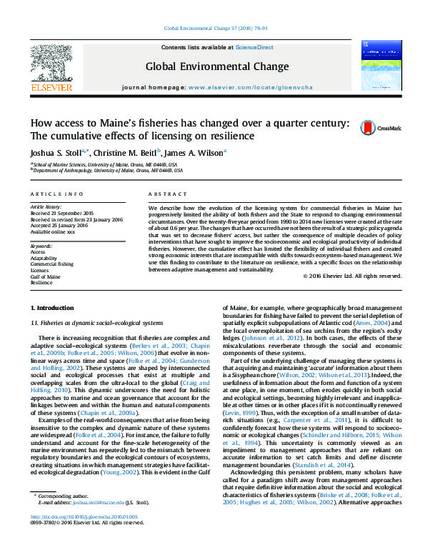
Article
How access to Maine’s fisheries has changed over a quarter century: The cumulative effects of licensing on resilience
Global Environmental Change
(2016)
Abstract
We describe how the evolution of the licensing system for commercial fisheries in Maine has progressively limited the ability of both fishers and the State to respond to changing environmental circumstances. Over the twenty-five year period from 1990 to 2014 new licenses were created at the rate of about 0.6 per year. The changes that have occurred have not been the result of a strategic policy agenda that was set to decrease fishers’ access, but rather the consequence of multiple decades of policy interventions that have sought to improve the socioeconomic and ecological productivity of individual fisheries. However, the cumulative effect has limited the flexibility of individual fishers and created strong economic interests that are incompatible with shifts towards ecosystem-based management. We use this finding to contribute to the literature on resilience, with a specific focus on the relationship between adaptive management and sustainability.
Keywords
- Access,
- adaptability,
- commercial fishing,
- licenses,
- Gulf of Maine,
- Resilience
Disciplines
Publication Date
Winter January 3, 2016
DOI
http://dx.doi.org/10.1016/j.gloenvcha.2016.01.005
Citation Information
Joshua S Stoll, Christine M Beitl and James A Wilson. "How access to Maine’s fisheries has changed over a quarter century: The cumulative effects of licensing on resilience" Global Environmental Change Vol. 37 (2016) p. 79 - 91 ISSN: 0959-3780 Available at: http://works.bepress.com/christine_beitl/6/
Creative Commons license

This work is licensed under a Creative Commons CC_BY International License.
